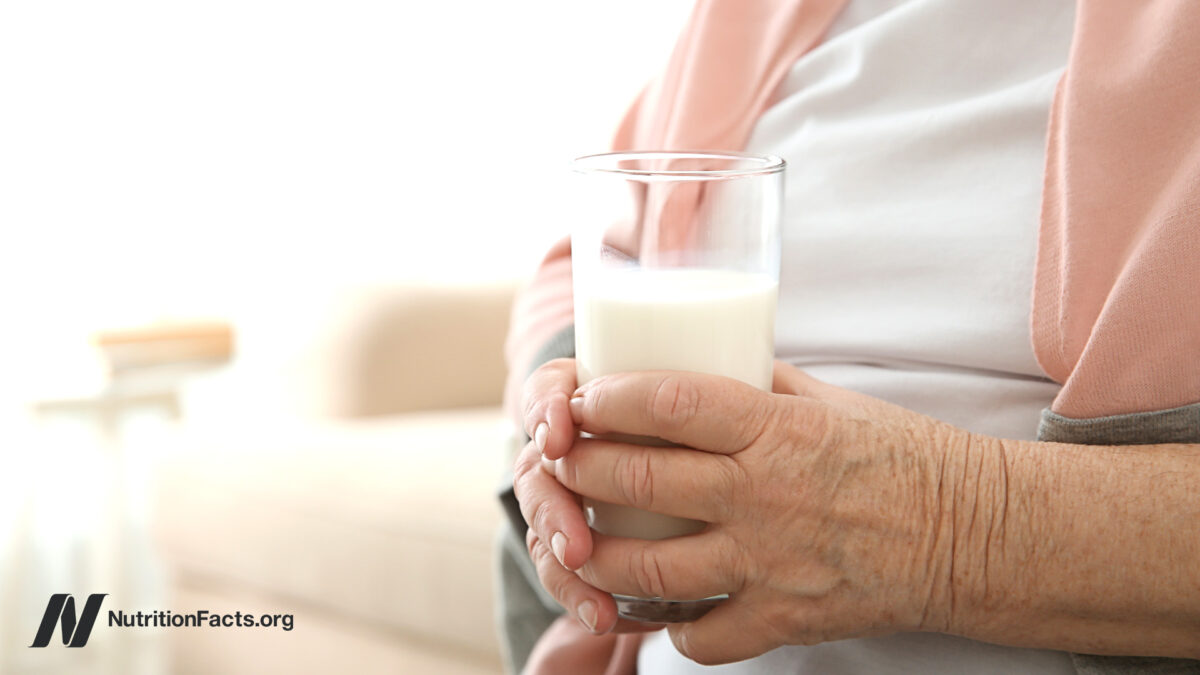There are so many ways we eat potatoes—baked, mashed, hashed, fried, scalloped, roasted, and more—but should we be eating them at all?
Potatoes and Diabetes
In 2006, the Harvard Nurses’ Health Study, which had followed the diets and diseases of tens of thousands of women for 20 years, found that greater potato intake was associated with a greater likelihood of getting type 2 diabetes, but of the hundred or so pounds of white potatoes Americans eat every year, most are deep fried and consumed as potato chips or french fries, and deep-fried foods are known to contain advanced glycation end products (AGEs), which we know are unhealthful. Researchers have found that just three servings of french fries a week is associated with a nearly 20 percent greater risk of type 2 diabetes, whereas there was only a tiny associated risk with potatoes in general, including fries.
There was still a diabetes link with mashed or baked potatoes, but people who eat more potatoes may eat more meat, and we know that animal protein is itself associated with increased diabetes risk. However, when researchers statistically adjusted for that, they still found an increased risk with potatoes.
Looking deeper, butter and sour cream are often put on mashed and baked potatoes, but when researchers tried to adjust for those and other such dietary factors, as well as effectively looking at the ratio between plant and animal fats and whether potato-eaters drank more soda or skimped on other vegetables, there still there seemed to be a potato-diabetes association.
By 2015, Harvard researchers had also looked into other cohorts, including the all-male Health Professionals Follow-Up Study to complement the all-female Nurses’ studies, and continued to find a small increased diabetes risk associated with baked, boiled, or mashed potatoes––though french fries appear nearly five times worse. The authors concluded that potatoes are considered to be a healthful vegetable in the Dietary Guidelines, though current findings cast serious doubts on that classification. (Walter Willett, the then-chair of Harvard’s nutrition department, went a step further, suggesting potatoes should be siloed with candy.)
Then, in 2018, a meta-analysis published on potato consumption and risk of type 2 diabetes combined all six of the prospective studies that had been done to date and found about a 20 percent increase in diabetes risk associated with each serving of potatoes a day. The researchers concluded that long-term, high consumption of potato may be strongly associated with increased risk of diabetes.
Does the story end there? If only there were a country where potato consumption was associated with a healthy diet. If potato consumption was still associated with diabetes there, then that would be concerning. As I discuss in my video Do Potatoes Increase the Risk of Diabetes?, a study out of Iran found that those eating the most boiled potatoes had only half the odds of developing diabetes. In Iran, not only is most of the potato consumption in the form of boiled potatoes, but those who eat potatoes have the healthiest diets and eat the most whole plant foods, such as fruits, vegetables, whole grains, and beans.
The bottom line is we don’t have convincing evidence to date that the intake of potatoes in general is linked to type 2 diabetes, but we should still probably hold the fries.
Potatoes and High Blood Pressure
What about potatoes and hypertension? And death? I dive into those topics in my video Do Potatoes Increase the Risk of High Blood Pressure and Death?.
Harvard researchers found that individuals who, on most days, ate potatoes—baked, boiled, or mashed, and not just french fries and potato chips—appeared to be at higher risk of developing high blood pressure. As mentioned above, salt and butter are often added to potatoes, but when they attempted to tease out the effects of salt and saturated fat, there still seemed to be a link between potato consumption and high blood pressure.
Again, though, what about the “meat” in “meat and potatoes”? The same Harvard researchers found that meat, including poultry alone, appeared associated with an increased risk of hypertension, as did a moderate amount of canned tuna. So, in the potato study, they endeavored to factor out any effects from the consumption of all types of meat yet still found an increased risk of hypertension associated with potato intake.
Two similar studies performed in Mediterranean Europe did not find any association between potato consumption and high blood pressure, though. Perhaps this is because, in that area of the world, potatoes aren’t typically smothered in butter and sour cream, and potatoes are often eaten with other vegetables.
So, Are Potatoes Bad for Us?
A primary reason we care about blood pressure is because we care about the consequences. In two studies done in Sweden, where they primarily eat their potatoes boiled, no evidence was found that potato consumption was associated with the risk of major cardiovascular disease; no relationship was found between potato consumption and risk of premature death in Southern Italy either. In the United States, though, potato consumption has been associated with increased mortality: a 65 percent increased risk of dying from heart disease, a 26 percent increased risk of fatal stroke, a 50 percent increased risk of dying from cancer, and increased risk of dying from all causes put together. However, all of that disappeared after adjustment for confounding factors. In other words, it wasn’t the potatoes at all. People who eat potatoes must just smoke more, drink more, or eat more saturated fat, for instance. Once all such other factors are considered, the link between potatoes and death disappears.
This was confirmed in the NIH-AARP study, the largest such study of diet and health in human history. If you just separate out the potatoes, researchers find they are not associated with increased risk of death—with the possible exception of french fries, which are associated with an increased risk of dying from cancer. Put all the studies together—20 in all—and no significant association has been found between potato consumption and mortality, though, again, fried potatoes may be the exception. Even if eaten just twice a week, fries may double one’s risk of dying prematurely, independently of other factors, but the consumption of unfried potatoes seemed to be neutral. (In terms of mortality, fried potatoes may not be as bad as fried meat—think fried chicken and fried fish—but that’s not saying much.)
Other whole plant foods—nuts, vegetables, fruits, and legumes (beans, split peas, chickpeas, and lentils)—are associated with living a longer life and significantly less risk of dying from cancer, dying from cardiovascular diseases like heart attacks, and 25 percent less chance of dying prematurely from all causes put together. However, no such protection is gained from potatoes for cancer, heart disease, or overall mortality. So, the fact that potatoes don’t seem to affect mortality can be seen as a downside. Remember, though, that potatoes aren’t like meat, which may actually actively shorten lifespan, but there may be an opportunity cost to eating white potatoes, since every bite of a potato is a lost opportunity to eat something even healthier—something that may actively enhance our lifespan.
So, potatoes are kind of a double-edged sword. The reason that potato consumption may just have a neutral impact on mortality risk is that all the fiber, vitamin C, and potassium in white potatoes might be counterbalanced by the detrimental effects of their high glycemic index, which I discuss in my video Glycemic Index of Potatoes: Why You Should Chill and Reheat Them. Not only are high glycemic impact diets robustly associated with developing type 2 diabetes, but current evidence suggests that this relationship is cause-and-effect.
The Potato Glycemic Index
Foods with a glycemic index (GI) above 70 are classified as high-GI foods, and those with a GI lower than 55 are low-GI foods. Pure sugar water, for example, is often standardized at 100, and white bread and white potatoes are high glycemic index foods.
Is there any way we can lower the glycemic index of potatoes? When potatoes are boiled, then cooled in the refrigerator, some of the starch crystallizes into a form that can no longer be broken down by the starch-munching enzymes in our gut. When put to the test, researchers actually saw a dramatic drop in glycemic index in cold versus hot potatoes. So, by consuming potatoes as potato salad, for instance, we can get nearly a 40 percent lower glycemic impact. The chilling effect might, therefore, also slow the rate at which the starch is broken down and absorbed. So, individuals wishing to minimize dietary glycemic index may be advised to precook potatoes and consume them cold or reheated. The downside of eating potatoes cold is that they might not be as satiating as eating hot potatoes, but we may get the best of both worlds by cooling them and then reheating them, which is exactly what was done in a famous study I profiled in my book How Not to Diet. The single most satiating food out of the dozens tested was boiled then cooled then reheated potatoes.
There’s an appetite-suppressing protein in potatoes called potato protease inhibitor II, but the way potatoes are prepared makes a difference. Both boiled and mashed potatoes are significantly more satiating than french fries. That was for fried french fries, though. What about baked fries? Individuals had a big drop in appetite after eating boiled mashed potatoes, compared to white rice or white pasta, which is right where fried french fries were, as well as baked french fries.
Do Potatoes Spike Our Blood Sugar?
White potatoes have a high glycemic index, as I mentioned, and consumption of high glycemic impact foods may increase the risk of diabetes. Normally after a meal, we’d like our blood sugars to just gently, naturally rise and fall, but with high glycemic foods like potatoes, we can get an exaggerated blood sugar spike. That leads our body to over-compensate with insulin, forcing our blood sugars lower than when we started, which results in negative metabolic consequences––such as a rise in triglyceride fats in the blood. However, potatoes are a good source of potassium, vitamin C, and polyphenols, which may counterbalance the glycemic impact. This may explain why potatoes appear to have a neutral effect when it comes to lifespan, unlike other whole plant foods that have been associated with actively living longer.
How to Reduce the GI of Potatoes
Aside from the chill-and-reheat method to dramatically lower the glycemic index of white potatoes, is there another way? Yes, and it’s the same way we make everything better in our nutritional life: Add broccoli. As I detail in How to Reduce the Glycemic Impact of Potatoes, the co-consumption of two servings of cooked broccoli with mashed potatoes immediately cuts the insulin demand by nearly 40 percent. In contrast, adding chicken breast makes matters worse, and adding tuna fish is even worse still, nearly doubling the amount of insulin our body pumps out.
Why does plant protein make things better, but animal protein make things worse? Because decreased consumption of branched-chain amino acids improves metabolic health. I cover this in my book How Not to Diet, as well as my video on the topic.
Something else can help, too: vinegar. Simply chilling potatoes may cut down on blood sugar and insulin spikes, but to get significant drops in both, just add about a tablespoon of vinegar (even plain white distilled vinegar) to drop levels by 30 to 40 percent. Just one to two tablespoons a day of vinegar diluted in water can significantly improve both short- and long-term blood sugar control in people with diabetes, which is why clinicians may want to incorporate vinegar consumption as part of their dietary advice for their patients with diabetes.







